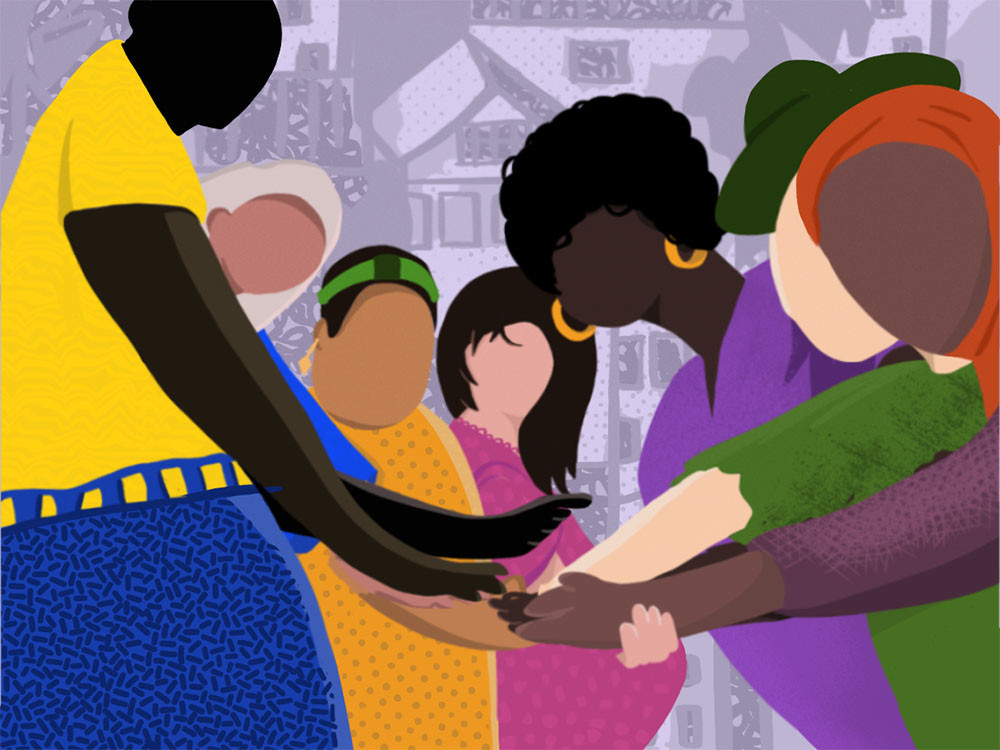 (Illustration by Raffi Marhaba, The Dream Creative)
(Illustration by Raffi Marhaba, The Dream Creative)
Supporting Solutions to the Housing Crisis
By Charles Rutheiser, Annie E. Casey Foundation

Housing is much more than a roof over one’s head. Having a place to call home is a basic human need—a place of safety, stability, support, and belonging. Stable housing roots people in their community and allows access to the opportunities that are necessary to thrive and enjoy a brighter future.
Housing stability is not something that millions of extremely low-income Americans can take for granted. According to the 2022 State of the Nation’s Housing report by Harvard Joint Center for Housing Studies, more than 70 percent of renters with incomes below $30,000 a year paid more than a third of their income for housing, and an additional 20 percent of them paid more than half, leaving very few resources to pay for necessities such as food and health care. The situation for extremely low-income homeowners was no better. The percentage of housing cost-burdened households earning less than $30,000 increased from 70 to 73 percent between 2019 and 2020.
Housing cost burdens are unequally distributed by race, with Black and Latino households two to three times more likely to pay outsized shares of their income toward housing. Significant racial disparities were not limited to housing costs. Households of color were significantly more likely to be evicted, foreclosed upon, or displaced from their homes by gentrification. They were also more likely to live in units that were overcrowded or contaminated by lead, asbestos, and other environmental hazards within high-poverty, low-opportunity communities. Families of color have also carried a heavier burden due to the pandemic, from higher rates of disease and mortality to higher rates of job loss and income that led to missed rent or mortgage payments.
The economic consequences of the pandemic sparked an unprecedented response to the housing crisis. Greater awareness of this issue led to national moratoria on evictions and foreclosures that kept millions of families in their homes, while more than $55 billion in emergency financial assistance for renters and homeowners helped millions of households pay off their housing debt. Preliminary data from the US Department of the Treasury indicates emergency rental assistance targeted low-income households of color. Dozens of states and localities passed new short- and long-term protections for tenants and explored new kinds of partnerships with nonprofit and community groups.
As the pandemic continues into its third year, many aspire to a return to “normal.” But with respect to housing, a return to how things were is neither possible nor desirable. Long-standing racial disparities provide evidence of how bias and discrimination are a feature, and not a bug, of our housing system. The dramatic increase in both rents and home prices threatens to intensify affordability challenges for low- and moderate-income families.
Coming Together to Respond
There is nothing simple about the issue of housing. It is an inherently complex and wonky domain, requiring an understanding of complex issues that defy simplistic solutions, quick fixes, and strictly partisan ideology. Getting our housing system to work better for all—especially for families of color who have long experienced discrimination and bias—will require a long-term concerted endeavor with coordinated efforts from a broad host of public, private, and community actors. Philanthropy has important roles to play in these efforts in providing funding, supporting community-led or directed efforts, and generating research and learning.
The Annie E. Casey Foundation’s mission is to create a brighter future for America’s children, young people, and families. While the foundation’s mission covers much more than just housing, it cannot achieve this mission without helping to ensure families have safe, stable, and affordable housing. To do so, the foundation focuses on improving housing stability, expanding the production or preservation of affordable housing for families, and ending youth homelessness. Casey seeks to accomplish these goals in a variety of ways, from investing and supporting research and policy advocacy to building the capacity of community, nonprofit, and public organizations to lift up the voices of young people.
But the foundation also recognizes that no group or organization can create meaningful change alone. To mobilize the full power and potential of philanthropy requires more effective collaboration and coordination among foundations. Notwithstanding the emergence of several funder collaboratives in recent years, such coordinated activity is still more of an exception than the rule. When Susan Thomas from the Melville Charitable Trust reached out to me more than six years ago about her idea for Funders for Housing and Opportunity (FHO), the value proposition was as clear and compelling as it was daunting. The goal was to bring the nation’s leading funders together from across sectors and perspectives in a funder collaborative to advance stable housing that connects people to better health, economic opportunity, and good jobs and schools, especially for those who have historically been denied access. Could foundations with unique missions and priorities go beyond talking and learning to aligned action?
Indeed, they could. It wasn’t easy, requiring sustained investment not only of funds, but of time, intention, and attention to build the collective, shared understanding and an organizational infrastructure that could endure over time, even as individual members moved on. FHO has endured because it has delivered value, not only to its grantees and the field but to its member organizations. Participating in FHO has helped the Casey Foundation develop a more sophisticated appreciation of the importance of housing while building lasting relationships with other funders. While the systemic issues that often make housing in the United States unaffordable or unstable cannot be fixed overnight, a growing coalition of funders, activists, and policy makers committed to lasting change is fighting for a day when everyone has a place they can call home.
* * *
A Collaborative Approach to Housing Justice
By Jeanne Fekade-Sellassie, Funders for Housing and Opportunity
Funders for Housing and Opportunity (FHO) is celebrating its fifth anniversary with a look back and a look forward in this in-depth series. We will offer ideas, observations, and lessons we’re learning from our housing justice efforts, including how and why the work is:
- Systemic—seeking long-term transformation of the systems that determine who gets what housing, and going beyond providing services to also changing policies, institutions, and structures;
- Anti-racist—designed to end the racialized experience of segregation, homelessness, and housing inequities and repair their devastating impact on communities of color by focusing on the people who are most impacted, shifting more power to those who are disadvantaged, and centering the needs, leadership, and priorities of people with lived experience; and
- Intersectoral—recognizing that housing affects outcomes in education, health, economic mobility, social justice, and the environment, so investments in housing stability are relevant to all types of funders’ goals.
FHO’s priorities for grantmaking focus on what we see as the key elements of system-level change: policy, advocacy, and organizing; narrative change; and elevating what works with cross-sector collaboratives at the local and state level. Our policy, advocacy, and organizing work seeks to change laws and regulations to make more money available for safe, affordable homes and to provide tenants with protections to remain stably housed. Narrative change seeks to shift people’s understanding of homelessness and eviction as results of structural issues, not personal failures, and to shift our understanding of safe, quality, affordable housing as a basic necessity rather than a transactional commodity only available to those with higher incomes. Elevating what works allows us to seed and support innovative efforts to change systems at the local and state level, with the voices of people with lived experience helping to drive the agenda.
We know that the key to understanding how a more just housing system could work, and how to support it, lies in the combination of these mutually reinforcing priorities. For there to be political will to invest more money in affordable homes, renter protections, and system improvements, decision makers need to change their perceptions about housing and homelessness. A new narrative will help change those perceptions. And to ground the new narrative and policies in knowledge from real places and community voices, we need to elevate local practices that show progress toward long-term systems change.
Funding collaboratives like FHO provide a place where funders can learn together about new and different ways of working that can inform their foundations and the broader philanthropic field. It’s a place where we can think big together, speak with a collective voice, and take action on topics and strategies that augment the scope of our individual foundations. Our members also tell us that FHO’s collegial, collaborative culture makes this a place where they build deep, trusting relationships that make grantmaking easier and amplify its impact.
After five years in the field, FHO has learned some lessons about philanthropy and systems change. For example, we know that the problem of housing injustice is systemic and interconnected, so the solutions must be, too. We’re coming at this in many ways, from funding Opportunity Starts at Home to mobilize housing advocates alongside educators, health professionals, civil rights and anti-poverty advocates, and members of faith-based communities to build political will and federal resources for national housing policy solutions to supporting cultural organizing work with Community Change, Policy Link, and Race Forward to grapple honestly with the narrative of housing as a fundamental right that everyone deserves, and reinforce these messages at scale through movies, music, art, poems, and television.
We all still have much to learn. While we hope to offer some lessons from our experience (and our mistakes), we are the first to admit that we don’t have all the answers. For example, we continually struggle to find more and better ways as funders to authentically honor, obtain, and integrate input from people with lived experience, both in our grantmaking and in how we operate as individuals and as a collaborative group.
How can we do our part to shift the field of philanthropy to better support BIPOC leaders and their organizations? What will it take for our sector to recast the definition of risk and the indicators of success we use so that we stop exclusively privileging long-established, white-led organizations with demonstrated experience and robust balance sheets while shutting out newer organizations led by people of color?
And how will we seize this moment to tackle the related crises in racial justice, housing justice, and climate justice in ways that significantly better outcomes for people who have long been denied opportunity? How can we do a better job of bridging the gulf between housing and other sectors, such as environmental justice?
We hope that readers will come away from this series with a deeper understanding of how housing justice is synonymous with racial justice and an invigorated sense of how they, no matter what their field of focus, can collaborate to support housing and opportunity. But, most of all, we hope that by creating this series, we will increase the focus on housing and funding of housing issues. And we hope we inspire others to share their insights with us so that together we can realize a nation where all people are stably housed in communities where they can thrive, free from the barriers and harms of systemic racism.
Support SSIR’s coverage of cross-sector solutions to global challenges.
Help us further the reach of innovative ideas. Donate today.
Read more stories by Charles Rutheiser & Jeanne Fekade-Sellassie.

